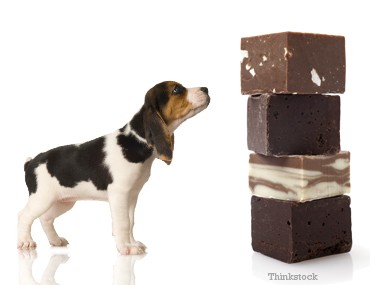Overview
Who doesn’t crave a nice piece of chocolate now and then? Unfortunately for our pets, the ingestion of chocolate can have serious side effects for them. Why? Chocolate contains two ingredients that are toxic in large quantities: a chemical called theobromide and caffeine. Not all types of chocolate contain the same amounts of theobromide and caffeine; therefore, the amount and the type of chocolate your pet eats play a role in its toxic effects.
For example, white chocolate and milk chocolate contain fewer toxic ingredients than do baking chocolate and cocoa beans. Remember that other household items can contain cocoa beans too. One popular item is cocoa mulch. Keeping your four-legged friends away from this mulch is important, especially when it is fresh and has a strong cocoa smell!

Symptoms
Signs your pet may have an adverse reaction to chocolate include:
- Diarrhea/vomiting from the high-fat content in the chocolate
- Restlessness
- Hyperactivity
- Muscle twitching, tremors
- Increased drinking and urination
- Excessive panting
- Irritability
- Increased heart rate and abnormal heart rhythm
In extreme situations, seizures, collapse, and even death can occur.
Treatment
Unfortunately, there is no specific antidote for pets that have ingested chocolate. If you suspect your dog or cat has eaten chocolate, you should contact your veterinarian immediately. She/he may recommend that you induce vomiting, depending on when the chocolate was ingested.
Depending on the amount and type of the chocolate ingested, your veterinarian may suggest your pet be admitted to the hospital so that the staff can monitor him for side effects and provide medical support, if necessary. The good news is that most pets treated for chocolate toxicity recover and return to normal within 24–48 hours of treatment.
Prevention
The best way to prevent chocolate toxicity is to keep all chocolate out of reach of your pet. Watch this video to learn more about foods that are toxic to dogs.
If you have any questions or concerns, you should always visit or call your veterinarian – they are your best resource to ensure the health and well-being of your pets.
